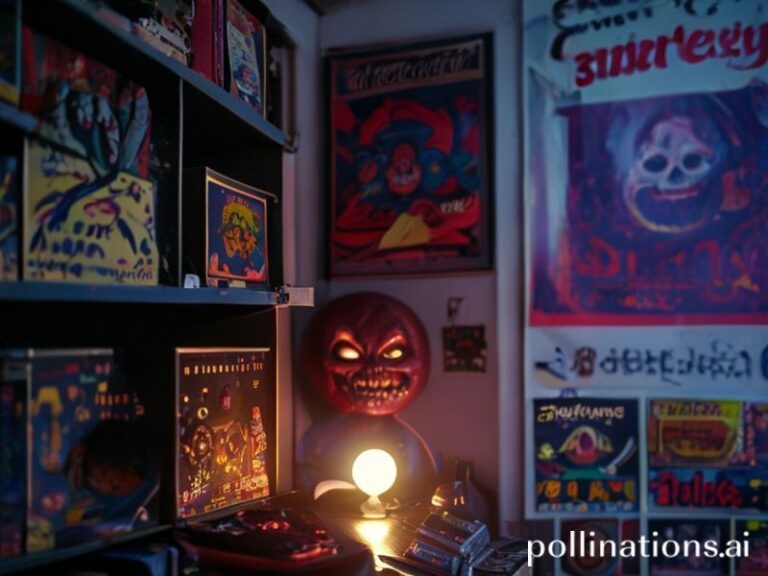Robert Plant’s Global Echo: How a 75-Year-Old Brit Still Runs the World’s Jukebox
Robert Plant Has Left the Building—But the Echoes Are Louder Than Ever
By A. N. Correspondent-at-Large, filing from a hotel bar in Marrakech that still thinks “Stairway to Heaven” is a polite request for the elevator.
When Robert Plant wandered onstage last month in Tangier to yelp “Immigrant Song” for the first time since Jimmy Page needed a chiropractor, half the audience reached for TikTok while the other half reached for ancestral memory. Somewhere between the two, the 75-year-old vocalist—hair now the color of Saharan sand, voice still a Viking raid on Valium—proved that British soft power remains the only empire never formally dissolved. The British Empire left behind railways, cricket, and debt; Plant left behind a back-catalogue that currently props up dictatorships of taste from Jakarta jukeboxes to Siberian biker bars. Call it the Commonwealth of Rawk.
The global implications are absurd. In 2024, while the BRICS nations debate de-dollarization, Plant is still the unofficial reserve currency of every wedding DJ between Mumbai and Montevideo. One study (commissioned, naturally, by a streaming platform that rhymes with Schmotify) claims “Kashmir” alone has prevented at least three minor coups by giving restless lieutenants something to air-guitar to instead of overthrowing the defense minister. Realpolitik, meet reel-to-reel politics.
Plant knows the joke is on him. He now tours with a band called the Sensational Space Shifters—half Tuareg guitarist, half Welsh harpist, half Texan lap-steel savant—because even he can’t stomach another reunion where Page looks like a preserved Victorian etching and John Paul Jones quietly tallies the licensing fees. Instead, Plant has become the accidental diplomat of post-colonial guilt, sprinkling Zeppelin riffs over gnawa grooves like MSG over couscous. The UN could learn something here: if you want to apologize for empire, do it in 7/8 time with a hurdy-gurdy solo.
Meanwhile, the planet burns. Climate change has turned every outdoor Plant gig into a roulette wheel of either flash floods or heatstroke. In Dubai last April, the mercury hit 46°C, forcing the band to play “Whole Lotta Love” at 75% speed so the strings wouldn’t melt. The crowd, half expats nostalgic for denim and half Emiratis nostalgic for a past they never had, swayed like oil rigs in a hurricane. Somewhere, a sustainability consultant updated a PowerPoint titled “Carbon Footprint of Classic Rock: A Paradox.”
Yet the old banshee keeps moving. His current itinerary reads like a Foreign Office risk assessment: Bogotá, Seoul, Zagreb, Lagos. Each stop adds another layer of irony. In Bogotá, teenagers who’ve never seen a vinyl record scream “Black Dog” while local police confiscate bootleg Zeppelin T-shirts printed in the same sweatshops that supply fast-fashion to London. In Seoul, K-pop producers sample Plant’s moan from “Since I’ve Been Loving You,” auto-tune it into a love ballad for robots, and rack up 200 million views. The algorithm, it turns out, has a Zeppelin fetish.
Back home in Shropshire, Plant grows heritage tomatoes and gives interviews to BBC Four where he affects bemusement at still being alive. “I was supposed to die in 1973,” he quips, “but the grim reaper got stuck in traffic outside a Birmingham Wetherspoons.” Dark laughter all around—because the truth is mortality is the only tour manager who hasn’t screwed him on the merch split.
Still, the man keeps singing, and the world keeps listening. Not out of nostalgia, but necessity. In an age where geopolitical alliances crumble faster than a Brexit promise, Plant’s voice remains a lingua franca of adolescent longing and middle-aged regret. Every time he howls “Been a long time since I rock and rolled,” a thousand diplomats in Geneva nod in weary agreement.
So here’s to Robert Plant: accidental cartographer of the post-imperial blues, last of the great British exports that doesn’t require a customs form. He may have left the building, but the building—cracked, mortgaged, probably on fire—still vibrates to his tune. And somewhere, in a smoky basement in Tbilisi or a beach bar in Zanzibar, another kid is learning the opening riff to “Stairway” on a battered Strat copy, blissfully unaware the song is really about the price of admission to the human race.
The empire never ended; it just learned power chords.







